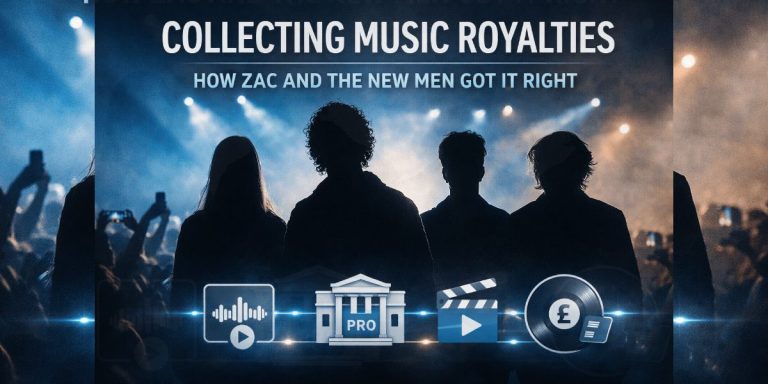Key Takeaway
Understanding the UK music industry starts with knowing the different types of labels—from major players to indie and genre-specific names. This guide offers an in-depth UK record labels list, insights on how to approach them, and key resources to support independent artists on their journey.
Links:
Table of Contents
Toggle- How to Start a Career as a Musician
- How to Get Signed by a Record Label in 2025
- How to Sell Your Music: A Guide for Independent Artists
- Best Free Music Distributor for Independent Artists
Introduction
Looking for a record label in the UK? Whether you’re an independent artist trying to break through or looking for industry support, knowing where to start is crucial. This guide will help you navigate the UK record label scene and find the best fit for your music.
For a detailed breakdown on how to get signed and insights into building a successful music career, check out our post on How to Start a Career as a Musician and our in-depth guide on How to Get Signed by a Record Label in 2025.
Major UK Record Labels List
The UK music industry is predominantly shaped by three major record labels: Universal Music Group (UMG), Sony Music UK, and Warner Music UK. These organizations manage various sub-labels, each specializing in multiple genres and nurturing domestic and international talent. Understanding these significant labels’ structures and artist rosters can help independent artists identify potential pathways for their music careers.
Universal Music Group (UMG)
Universal Music Group is the world’s largest music company, encompassing numerous sub-labels that cater to a wide range of musical genres. Key divisions within UMG include:
- Island Records: Known for representing artists such as U2, Florence + The Machine, and Dermot Kennedy.
- Polydor Records: Home to acts like Billie Eilish, Sam Fender, and The Rolling Stones.
- Capitol Records UK: Features artists including Sam Smith, Paul McCartney, and Liam Payne.
- EMI Records: Hosts talents such as Taylor Swift, Elton John, and Bastille.
Artists signed under UMG benefit from extensive global distribution networks, substantial marketing resources, and collaborations with some of the most influential figures in the music industry.
Sony Music UK
Sony Music UK is a leading music company managing a diverse portfolio of sub-labels, each with its unique artistic direction. Notable sub-labels include:
- Columbia Records UK: Represents prominent artists like Adele, Harry Styles, and Calvin Harris.
- RCA Records UK: Features acts such as Little Mix, PinkPantheress, and Bring Me The Horizon.
- Epic Records UK: Hosts artists including Meghan Trainor, DJ Khaled, and J Hus.
Sony Music UK is renowned for its strong artist development programs and a track record of nurturing long-term careers, providing artists with robust support in creative and commercial endeavours.
Warner Music UK
Warner Music UK is a prominent player in the British music scene, overseeing several influential sub-labels. Key divisions include:
- Atlantic Records UK: Home to artists like Ed Sheeran, Anne-Marie, and Mahalia.
- Parlophone Records: Features bands and artists such as Coldplay, Gorillaz, and Lily Allen.
- Warner Records UK: Hosts talents including Dua Lipa, Muse, and Biffy Clyro.
Warner Music UK is recognized for its innovative approach to artist promotion and a commitment to fostering both emerging and established talent, offering tailored strategies to navigate the evolving music landscape.
Which Major Label is Right for You?
Each of these three major labels has its strengths. The best choice depends on your music genre, career goals, and artistic vision:
- Want global marketing power? Go with Universal Music UK—they have the biggest budget and international reach.
- Prefer strong brand partnerships and long-term development? Sony Music UK excels in fostering lasting careers and artist collaborations.
- Need fast growth as a rising artist? Warner Music UK is known for breaking new talent quickly and adapting to trends.
Before reaching out to any label, research their artist rosters, submission policies, and past signings to ensure your music aligns with their brand and vision.

Major vs. Independent UK record Labels Lists: Which is Right for You?
| Feature | Major Labels | Independent Labels |
| Global Reach | High | Medium to Low |
| Creative Control | Limited | High |
| Financial Support | High | Varies |
| Artist Development | Varies | High |
| Marketing Power | Strong | Targeted |
This table provides a quick comparison to help you decide which type of label suits your career goals.
Choosing between a major or independent label? If you want creative freedom, indie labels are a great option. If you need global reach, major labels offer stronger marketing. Consider your career goals before making a move.
Top Independent UK Record Labels List
Independent labels offer more creative freedom and often focus on niche genres. Here are some of the most notable indie labels in the UK:
- 4AD – Known for alternative rock and indie pop artists like The National and Grimes.
- Domino Recording Company – Home to Arctic Monkeys and Franz Ferdinand.
- XL Recordings – Recognized for working with artists such as Adele and Radiohead.
- Warp Records – A leading name in electronic and experimental music, featuring Aphex Twin.
- Ninja Tune – Focuses on electronic, hip-hop, and alternative sounds.
- Beggars Banquet Records – Part of the Beggars Group, influential in the indie scene.
- Rough Trade Records – Known for post-punk and indie rock artists.
- Mute Records – Specializes in electronic and experimental music.
- Heavenly Recordings – Features indie pop and alternative rock acts.
- Transgressive Records – Supports eclectic and innovative artists.
Independent labels provide more hands-on artist development, making them an excellent choice for musicians who value creative control.
Genre-Specific UK Record Labels List
Some labels specialize in specific music styles, which can be an excellent advantage for artists seeking genre-specific expertise and audiences.
- Electronic & Dance: Warp Records, Ninja Tune, Hospital Records
- Hip-Hop & R&B: Tru Thoughts, High Focus Records
- Rock & Alternative: Transgressive Records, Cooking Vinyl
- Pop & Commercial: Polydor Records (Universal Music), Island Records
Selecting a label that aligns with your genre ensures a better fit for marketing, promotion, and audience engagement.

How to Contact UK Record Labels (and Get Signed)
Getting signed requires more than talent; it demands a strategic and professional approach.
Research the Label
Each record label has a unique identity, sound, and artist roster. Before submitting your demo, research their current artists, submission policies, and brand direction.
Prepare a Strong Press Kit
Want to learn how to effectively sell and promote your music as an independent artist? Read our detailed guide on How to Sell Your Music: A Guide for Independent Artists.
Your press kit should include:
- High-quality recordings
- A professional artist biography
- Press photos and artwork
- Notable achievements or press coverage
- A well-crafted pitch letter
Follow Submission Guidelines
Each label has specific requirements for accepting demos. Check their website for submission details, preferred file formats, and contact methods.
Network with Industry Professionals
Building connections can be as valuable as your demo. Attend industry events, connect with A&Rs, and engage with music communities.
For more actionable steps on securing a deal, visit our guide: How to Get Signed by a Record Label in 2025.
Resources for Independent Artists
Looking for the best way to distribute your music independently? Check out our article on Best Free Music Distributor for Independent Artists to learn how you can get your music on streaming platforms while maintaining control.
- Association of Independent Music (AIM) – Supports independent artists and labels in the UK.
- PRS for Music – Assists artists in collecting royalties and managing performance rights.
- BBC Music Introducing – Provides a platform for emerging artists to showcase their work.
- Melody Rights – Helps artists manage distribution, rights, and retaining 100% of their royalties while maintaining control over their music.
Conclusion – UK record labels list
The UK music industry is full of opportunities, whether you’re aiming for a major label deal or looking for a dedicated independent partner. The key to success lies in understanding the landscape, researching the best fit, and presenting yourself as a serious artist.
Ready to distribute your music and build your career?
Use Melody Rights to manage your music and maximize your earnings. [Get started today]
Frequently Asked Questions (FAQ)
What are the major record labels in the UK?
The UK’s biggest labels are Universal Music Group (UMG), Sony Music UK, and Warner Music UK, which control a large portion of the industry and sign globally recognized artists.
How do I get signed to a UK record label?
Build a strong portfolio, grow your fanbase, and network with industry professionals. Research labels that fit your style, follow submission guidelines, and be persistent. More details: How to Get Signed by a Record Label in 2025.
Major vs. Independent Labels: What’s the Difference?
- Major labels offer global reach, big budgets, and strong promotion but require more creative control.
- Independent labels provide more artistic freedom and hands-on support but have fewer resources.
Can I release music without a record label?
Yes! Platforms like Melody Rights allow artists to distribute their music while keeping 100% ownership and royalties. Learn more: Best Free Music Distributor for Independent Artists.



